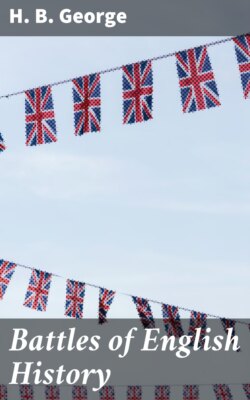Читать книгу Battles of English History - H. B. George - Страница 3
На сайте Литреса книга снята с продажи.
PREFACE
ОглавлениеTable of Contents
It has been the business of my life to teach history: and the informal division of labour which comes to pass in a University has led me to pay special attention to the military side of it. This aspect of history involves much comparison of statements and weighing of evidence, and is therefore calculated to be very useful to those for whom the study of history is, not their permanent occupation, but the means of completing their mental training. Campaigns and battles present in an exceptionally clear shape the stock problems of history, what was done, why it was done, what were the results, what ought to have been done, what would have been the consequences if this or that important detail had been different.
It is however not easy to gain from books a clear general idea of a campaign or a battle, harder perhaps than to obtain a similar grasp of the work of a legislator, or of the drift of a social change. To the ordinary historian the military side is only one aspect of his theme, and very possibly an aspect which interests him but little. He narrates the facts as given him by his authorities: but when these are vague, as mediæval writers mostly are, or discrepant, as modern writers are who mean to be precise and write from different standpoints, he need be something of an expert to make his narrative lifelike. On the other hand, purely military works are, very reasonably, technical: they are written for experts, to whom the technical language is familiar, and they often go into considerable detail. Ordinary readers are apt, consequently, to want help in obtaining from them a clear idea of the outline of events. Like Pindar's poetic shafts, they are φωνᾶντα συνετοῖσιν, ἐς δὲ τοπὰν ἑρμηνέων χατίζει.
Having experienced these difficulties myself, both as student and as teacher, I have thought that I might render some service by trying to act as interpreter, and to describe the chief military events of English history in a way which shall not be technical, but yet shall bring out their meaning. I do not write for experts, though it is they who must judge whether I have described correctly. I write for those who do not know much about battles, and would like to understand events which are interesting in themselves, and are great turning-points in history: they must judge whether I have described intelligibly. If I have met the proverbial fate of those who sit on two stools, it is not for want of pains in trying to keep my balance.
I feel that it is prima facie presumptuous for a civilian to write what is in some sense a military book: but after all it is the customer who feels where the shoe pinches. Moreover many of the battles of English history occurred in past ages, in relation to which the professional training of a modern soldier would teach him little beyond the permanent principles of strategy, which every educated man should understand. Given also an elementary knowledge of tactics, which has spread pretty widely in this country since volunteering began and the war-game became popular, a civilian ought to be able to deal adequately with Hastings and Crecy, with Towton and Marston Moor, if not with the campaigns of Marlborough and Wellington. If I have failed, it is not because the subject is outside the province of a civilian, but because the writer has been unequal to his task.
Si vis pacem, para bellum is a sound maxim for statesmen: for ordinary citizens it may be paraphrased thus—the better you understand war, the more you will desire peace. I have found that soldiers' love for peace, and horror of war, is usually in proportion to their experience: they deem no sacrifice too heavy to secure the greatest of national blessings. I think therefore that it is reasonable for one who belongs to a profession pre-eminently peaceful, to attempt to aid his countrymen in realising what war means. The better they understand this, the less they will be tempted to enter on war lightly, the more they will feel how amply worth while is every effort to put their country beyond the risk of attack.
I wish here to acknowledge a great debt of gratitude to my friend Col. Cooper King, formerly Professor of Tactics at Sandhurst, who has not only taken great trouble in drawing the maps to suit my scheme, but has also obtained for me useful information, besides helping me with some valuable suggestions and much friendly criticism. I would not however do him the ill service of sheltering myself behind his authority as an expert. The faults of my work, whatever they are, are mine and not his, though they might well have been more numerous without his assistance.
I have made no reference to the naval battles of English history, hardly less numerous than the great land battles, and, two or three of them at least, even more important. To deal with them adequately would require knowledge to which I cannot pretend. Moreover they might best be treated on a separate plan, similar perhaps to that which I have followed, but entirely distinct from it.
Oxford, Jan. 1, 1895.
